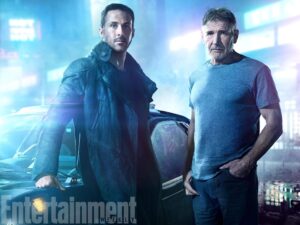by The Cowl Editor on October 19, 2017
Arts & Entertainment

by Alexis Jais ’18
A&E Staff
“More human than humans,” you say? In the recently released film Blade Runner 2049, director Denis Villeneuve has created a world that shows the powerful possibilities of artificial intelligence. This science fiction film is a piece that lightly implies that the utilization of artificial intelligence is imminent in the coming years.
Artificial intelligence continues progressing to levels previously unimaginable. The phrase “more human than humans” should strike anxiety into the hearts of those who dread a future like one depicted in neo-noir thrillers like Ridley Scott’s Blade Runner and its recent sequel Blade Runner 2049.
The original film Blade Runner was released in 1982 and was based heavily on the science fiction novel Do Androids Dream of Electric Sheep? by Philip K. Dick. The movie takes place in Los Angeles in 2019 during a time when Tyrell Corporation, the biggest technology company in the world, introduces human-like androids that are advertised to be “more human than humans,”a race of beings that somehow makes the idea of slavery acceptable once again.
The sequel film Blade Runner 2049, which was released on Oct. 6, fasts forward to the year 2049 when replicants have been fully and successfully integrated into society as slaves and servants. Newer replicants are given artificial childhood memories while they are held to different standards in the workplace than their human counterparts. These new replicants are also hired and forced to kill obsolete replicants, while paving the way to a revolutionary climate throughout the course of the film.
While the creation of such an advanced being may seem much farther off than 2019, or even 2049, in a time when technological innovation is advancing alarmingly fast we can hardly ignore the parallels drawn between dystopian flicks and our present-day reality. Artificial intelligence is becoming more popular within workplaces, schools, and for recreational uses as well.
The world we live in today has many technological advancements such as Cleverbot. Cleverbot is a website that allows users to converse with a programmed ‘being’ called Cleverbot. Although no human is behind this ‘being’ responding to questions asked by users of the site, Cleverbot learns from each conversation it has. It is able to collect answers and data that it was not initially programmed with and use any new information for future conversations.
Countless non-tech companies, including colleges, investment banks, logistics industries, and law firms around the world are using artificial intelligence to transform and develop the abilities and success of their businesses.
Regardless of how far-fetched the films seem from our current reality, the concepts that directors Scott and Villeneuve imagined in both Blade Runner films are intriguing and relevant more now than ever.
The Blade Runner of 1982 was ahead of its time. The film ambitiously predicted a future that is unsettlingly possible. The recent sequel projects a realized understanding that the concepts in the film are comfortingly further away than Scott might have expected by 2017.